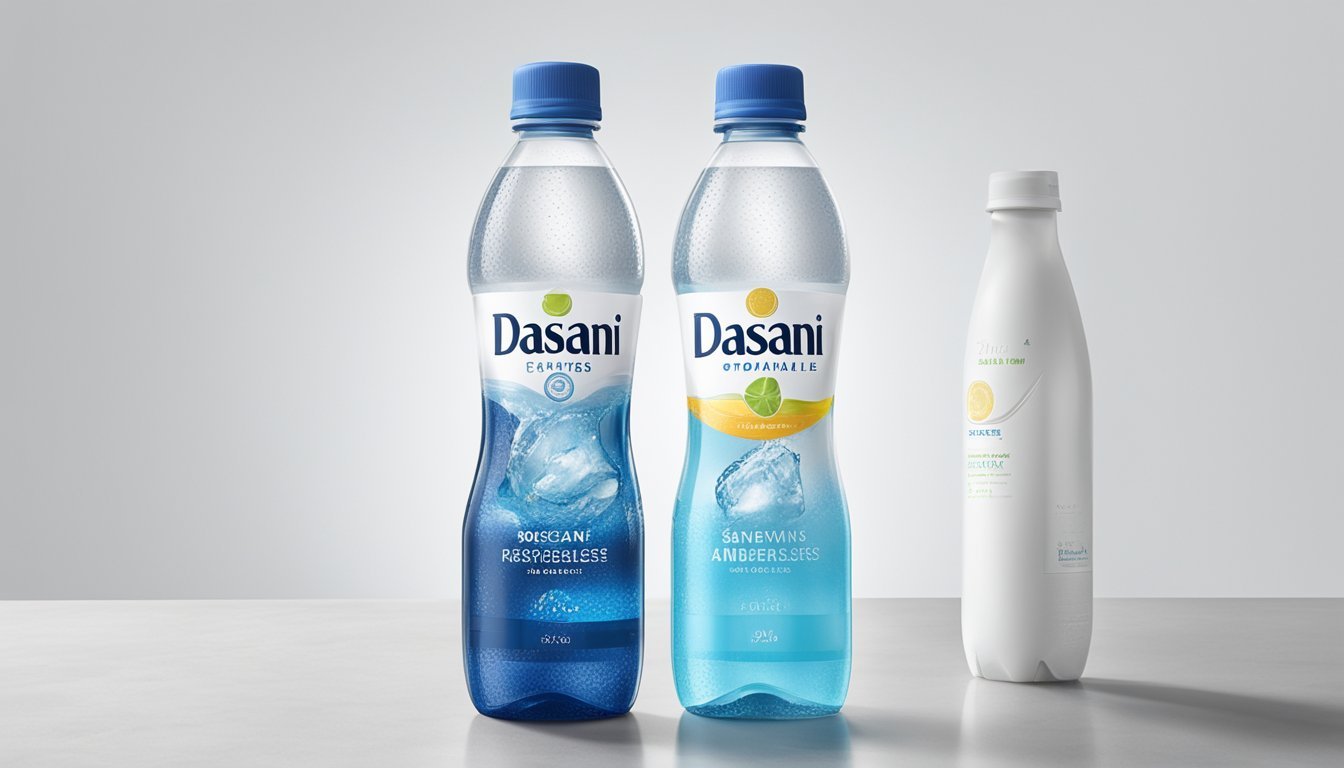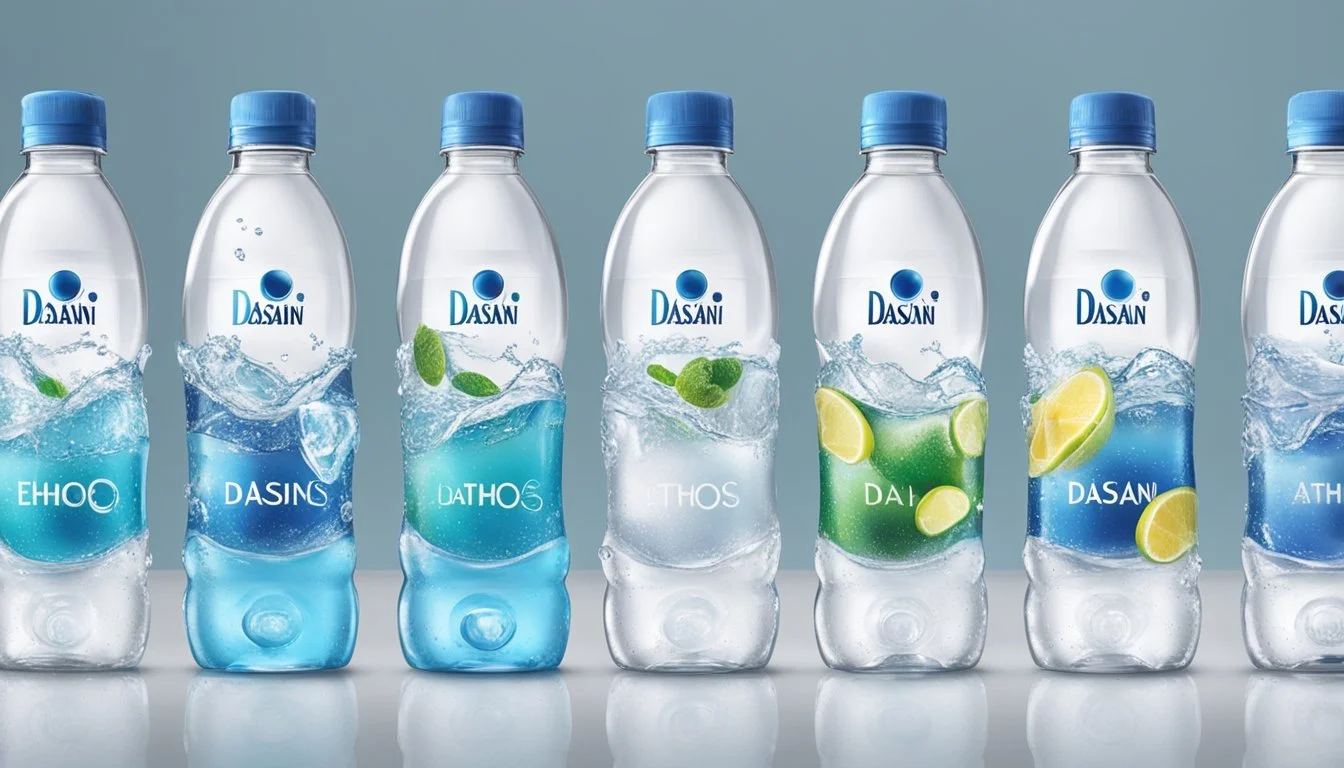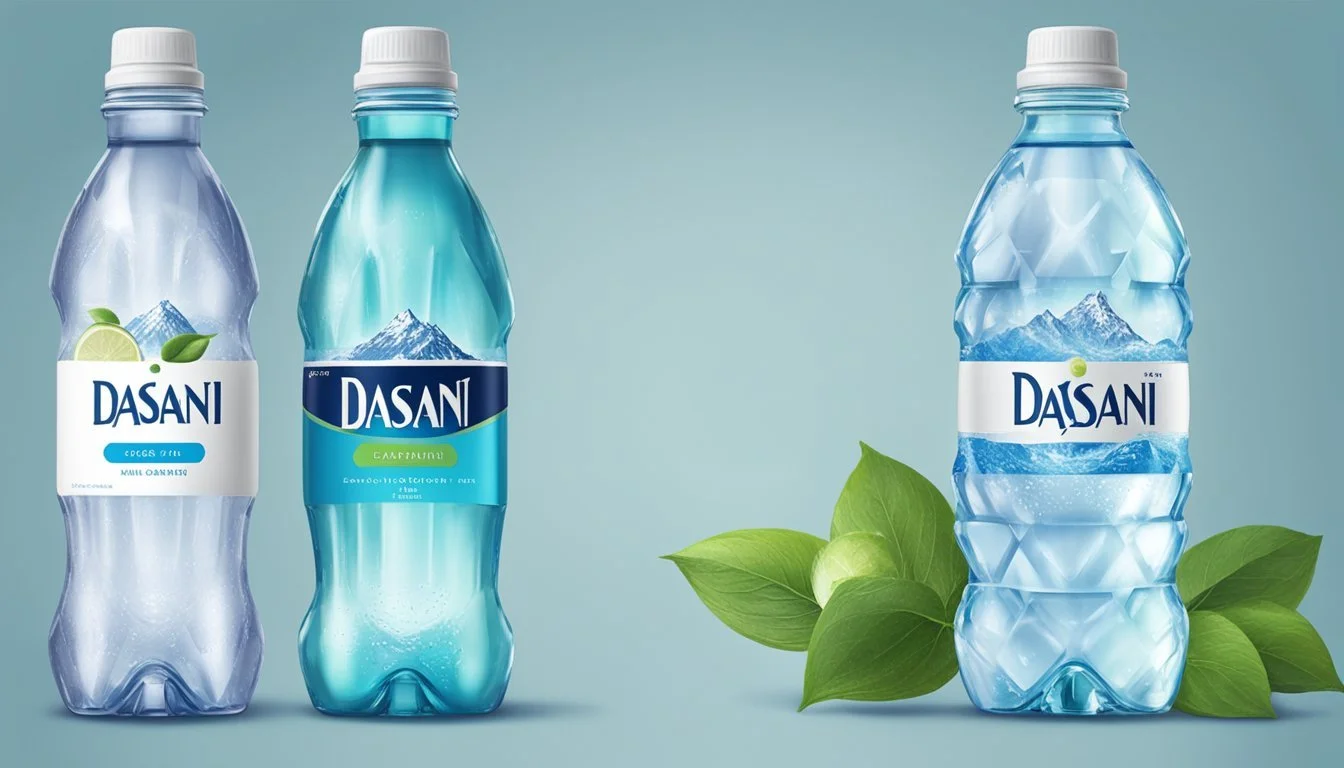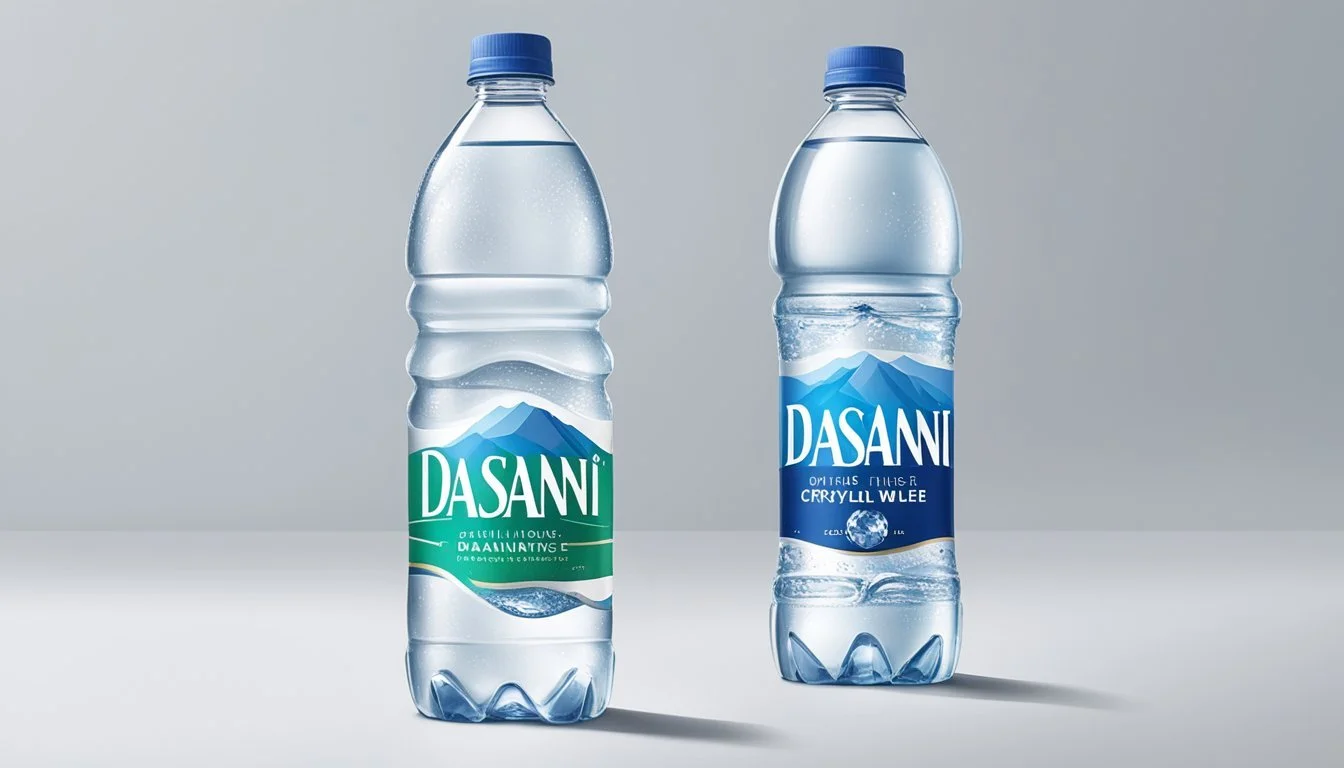Dasani vs. Ethos
Comparing Quality and Taste in Bottled Water Brands
When deciding between bottled water brands, consumers often take into account factors like taste, purity, source, and even the brand’s ethical stance. Dasani and Ethos Water emerge as notable contenders in the bottled water market, each with its own set of characteristics that appeal to different consumer preferences. Dasani, a product of The Coca-Cola Company, is known for its wide availability and distinctive taste due to added minerals. Ethos Water, owned by Starbucks, differentiates itself with a mission-driven approach, promising to contribute a portion of its profits towards humanitarian water programs.
While the choice of bottled water may seem trivial to some, for others, it is a deliberate decision influenced by the product's attributes and the values of the company behind it. Dasani's approach focuses on consistent quality and a taste profile that some consumers prefer. In contrast, Ethos Water positions itself not just as a beverage but as a social statement, appealing to those who prioritize ethical considerations in their purchasing decisions.
Thus, in the matchup between Dasani and Ethos Water, the question of which bottled water is better does not only rest on the sensory experience but also intertwines with the ethos of the brands themselves. The comparison transcends mere hydration, encompassing the broader impacts of consumer choices on health, the environment, and global societies.
History and Market Presence
In this section, the inception of Dasani and Ethos Water is explored, along with their respective market presence. Each brand has unique origins and a distinct market strategy. Dasani operates under the powerhouse Coca-Cola, while Ethos Water promotes social responsibility and has established a significant relationship with Starbucks.
Dasani: Brand Origins and Coca-Cola
Dasani was introduced by Coca-Cola in 1999, entering the crowded bottled water market that includes heavyweights like Nestlé. As part of Coca-Cola's product line, Dasani quickly gained shelf space and consumer recognition, leveraging Coca-Cola's extensive distribution network. The brand has faced challenges and controversies, such as the claim that it merely repackages tap water, but it has maintained a strong market presence.
Founded: 1999
Parent Company: Coca-Cola
Market Strategy: Leverage Coca-Cola's distribution
Ethos Water: Social Mission and Starbucks Partnership
Ethos Water began with a social mission: to help provide clean water to communities in need. The company caught the attention of Starbucks and subsequently formed a partnership in 2005. Starbucks' global presence has played a significant role in expanding Ethos Water's reach, with a portion of each sale supporting water access initiatives.
Founded: 2001
Partner: Starbucks (since 2005)
Social Mission: Support clean water access
Business Strategy: Blend product sales with philanthropy
This relationship between Ethos Water and Starbucks demonstrates a business model that aligns commercial success with social impact, setting Ethos apart from competitors in the bottled water market. While Dasani's approach aligns with conventional corporate strategies, Ethos capitalizes on consumer appeal towards brands with social commitments.
Water Quality and Sources
When comparing bottled water brands, consumers often look at the water quality and sources. These factors are pivotal as they determine the taste, purity, and overall health impact of the water.
Dasani: Filtration Process and Ingredients
Dasani water originates from local municipal water supplies. The brand employs a rigorous filtration process, which includes reverse osmosis, micron filtration, and ozonation to ensure the removal of impurities and contaminants. In terms of ingredients, Dasani water is known to add a blend of minerals, such as magnesium sulfate, potassium chloride, and salt (sodium chloride), for taste enhancement. The addition of these minerals is precisely controlled to maintain the consistency of Dasani's signature taste.
Ethos Water: Source and Purity
Ethos Water is sourced from underground springs and goes through natural filtration through volcanic rock, which enriches the water with various minerals. The brand touts its commitment to providing clean and pure water, which is reflected in the absence of additives or contamination. Ethos Water's source and natural filtration process ensure the purity of the water, appealing to those who prefer water with minimal human interference in its composition.
In comparing both, it's evident that the choice between Dasani and Ethos may come down to a preference between highly controlled purification with added minerals and naturally sourced water with inherent mineral content.
Taste and Consumer Preferences
When evaluating bottled water like Dasani and Ethos, taste and consumer preferences often come down to the mineral content and pH level, as well as insights from blind taste tests.
The Role of Minerals and pH Level
One's preference for Dasani or Ethos may be influenced by the mineral content and the pH level of the water. Dasani has a distinct blend of minerals and a slightly acidic pH, which can provide a characteristic taste that some consumers find appealing, while others may detect an aftertaste. In contrast, Ethos Water often has a higher pH, which contributes to a smooth taste and may lack the aftertaste some associate with lower pH waters.
Blind Taste Tests: Insights from Consumers
Blind taste tests can offer revealing insights into consumer preferences between Dasani and Ethos. Such tests strip away brand biases, focusing solely on flavor. Results can vary widely, with some participants favoring the crisp taste of Dasani which could be due to its additional minerals, while Ethos is sometimes preferred for its purity and balanced taste. A lack of aftertaste is frequently cited as a positive attribute in these tests and waters with a high pH or personal preferences for a more neutral or even fruity flavor note can sway opinions.
Health and Safety Considerations
When choosing between Dasani and Ethos bottled waters, consumers often evaluate health and safety considerations, such as the regulatory standards each brand meets and the potential presence of additives or contaminants.
Regulations: FDA vs. EPA Standards
Food and Drug Administration (FDA) regulations govern bottled water quality, closely modeled after the Environmental Protection Agency's (EPA) standards for tap water. It's crucial to understand that both Dasani and Ethos are subject to these FDA regulations, ensuring that their products meet strict safety and quality criteria before reaching the consumer.
Dasani: Dasani water is sourced from local municipal water supplies, subsequently filtered through a multi-step purification process. These steps are mandated to meet or exceed the FDA's guidelines for contaminants, ensuring safety for consumption.
Ethos: Sold mainly at Starbucks locations and part of a social enterprise effort, Ethos water goes through a similar purification process and complies with FDA standards.
Concerns Over Additives and Contaminants
Additives such as potassium chloride are sometimes included in bottled waters for taste and to provide electrolytes. However, consumers should note:
Dasani: This brand lists minerals added for taste, such as potassium chloride, magnesium sulfate, and salt. While generally safe, excess intake of these substances could pose health risks, especially for individuals with specific dietary restrictions or kidney problems.
Ethos: Ethos water highlights its purity and minimal processing, aiming to provide water that complies with health and safety norms without extensive alterations.
Contaminants are another area of concern for water scientists. Bottled water brands strive to keep contaminant levels well below dangerous thresholds, including BPA—a chemical associated with plastic containers that could potentially leach into water.
Dasani: Since Dasani uses PET plastic bottles, they are BPA-free, reducing risks associated with this contaminant.
Ethos: Ethos also uses BPA-free packaging, ensuring that their bottles do not impose the risk of BPA contamination.
Lastly, pH levels in water can impact its taste and potential health effects, although typically not to a dangerous extent. Both Dasani and Ethos maintain pH levels that are within the acceptable range set by FDA regulations, posing no significant health risk to consumers.
Environmental Impact
The discussion of the environmental impact of bottled water brands like Dasani and Ethos primarily surrounds their carbon emissions and packaging materials.
Bottled Water and Carbon Emissions
Bottled water companies contribute to carbon emissions throughout their production and distribution processes. Dasani, a product of The Coca-Cola Company, uses a reverse osmosis filtration process and adds minerals for taste. The brand has taken steps to reduce its carbon footprint by introducing the PlantBottle, made with up to 30% plant-based materials, which reportedly cut carbon emissions by up to 25%. Ethos Water, owned by Starbucks, aims to support water accessibility initiatives, yet the environmental cost of its bottled product is significant—primarily due to the energy-consuming lifecycle from production to transportation.
Carbon Emissions: The production of bottled water necessitates energy for purification, bottling, and transport. Such processes generate carbon emissions, contributing to climate change.
Packaging: Plastics and Alternatives
Packaging plays a major role in the environmental sustainability of bottled water. Dasani uses recyclable plastic bottles, including some derived from plants. Ethos Water also offers bottles made from recyclable materials; however, the widespread use of plastic in the industry has led to concerns about waste and pollution. Innovations like boxed water are less common but are gaining attention as an alternative with a lower carbon footprint.
Dasani: Up to 30% plant-based materials in PlantBottle packaging
Ethos: Recyclable bottle materials
Comparatively, non-plastic alternatives like boxed water represent a small fraction of the market but offer a reputation of reduced environmental impact due to their biodegradability and lower carbon emissions profile during production and breakdown.
Boxed Water: Alternative packaging with potential reduced carbon footprint and higher biodegradability
Efforts to manage the environmental impact of bottled water include the adoption of alternative packaging, efficient production processes, and responsible sourcing, though the convenience of bottled water and the scale of distribution continue to pose challenges.
Branding and Consumer Trust
In the bottled water market, branding and consumer trust are critical factors that influence purchasing decisions. Distinct marketing strategies bolster brand loyalty, while public perception and reputation can have lasting impacts on a brand's success.
Marketing Strategies of Leading Brands
Dasani, a brand under Coca-Cola, and competitors like Smartwater and Evian adopt diverse marketing approaches to appeal to customers. Dasani emphasizes the purity and enhancement of its product through filtration, while Smartwater markets itself as vapor-distilled with added electrolytes for taste. Evian leverages its source, the French Alps, hinting at natural purity.
Fiji differentiates itself with a tropical image and the notion of water untouched by man.
Voss, known for its sleek bottle design, aims at a premium market segment.
Ice Mountain and Poland Spring, appeal to consumers as reliable everyday options.
PepsiCo’s Aquafina uses eco-friendly messaging, as does Icelandic Glacial with its CarbonNeutral certification. Core Hydration also targets health-conscious consumers with its pH-balanced promise.
Case Studies: Brand Loyalty and Reputation
Specific events have tested consumer trust, notably the claims against Dasani being tap water versus a natural source, impacting its reputation among some consumers. Conversely, brands like Fiji and Icelandic Glacial have maintained a loyal customer base by consistently emphasizing their natural sources and sustainability efforts.
Aquafina adjusted their label to be transparent about its public water source origin.
In 2019, a viral video by Shane Dawson sparked discussions about Dasani, leading to scrutiny regarding taste and ingredients like magnesium sulfate, potassium chloride, and salt.
Brand Reputation Factor Impact on Brand Loyalty Dasani Accused of misleading source Decreased trust Ice Mountain Source transparency Neutral/Positive trust Icelandic Glacial Sustainability and natural source High trust
Both positive branding and trustworthy reputations play pivotal roles in the bottled water industry's competitive landscape.
Comparison and Final Recommendation
When assessing Dasani and Ethos, it's imperative to analyze them from various angles such as source, processing, taste, and consumer needs.
Comparing Dasani and Ethos Across Metrics
Source:
Dasani: Filtered tap water with added minerals for taste.
Ethos: Purportedly natural spring water with a mission to help children get clean water.
Taste:
Dasani is known for its consistent, clean taste due to the controlled addition of minerals.
Ethos, while it receives praise for taste, its profile can vary due to its natural source.
Environmental Initiatives:
Dasani has initiatives to reduce plastic but has faced scrutiny for its environmental impact.
Ethos stands out with a clear mission: for each bottle sold, a portion of the profit is used to fund clean water programs.
Price Point:
Dasani is generally priced affordably and is widely available.
Ethos tends to be more expensive, reflecting its social enterprise model.
Consumer Preference:
Dasani has wide recognition but has encountered controversy for being filtered tap water rather than natural spring water.
Ethos, with its altruistic angle, appeals to consumers willing to spend more for a perceived better cause and quality.
Choosing the Best Bottled Water for Your Needs
Consumers should consider the following:
Taste: If the addition of minerals and a consistent taste is a priority, Dasani might be preferred.
Ethical Consumption: If contributing to social causes is important, Ethos could be the choice as it supports clean water initiatives.
Price and Availability: Budget-conscious consumers may lean towards Dasani for its affordability and widespread distribution.
Ultimately, the best bottled water is subjective and based on individual preferences and values. While Dasani and Ethos offer contrasting propositions, they each serve distinct consumer segments in the bottled water market.








